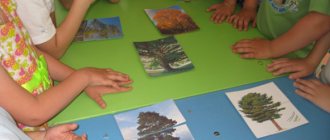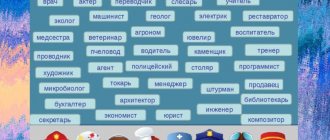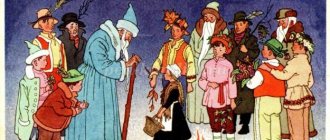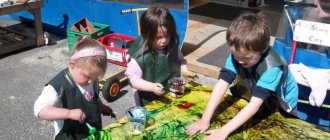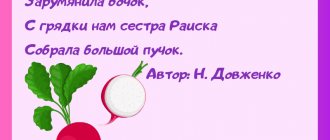Summary of GCD in the preparatory group "Soon to school"
GCD move:
Leading:
Guys, when people meet each other, first of all... What do they do?
Children:
Say "Hello" to each other
Student:
That's right, they greet each other. Any communication begins with a greeting. Now, I suggest we greet each other with a smile and say how glad we are to see each other.
Exercise “Hello friend!”
- "Hello Friend!"
- shake hands.
- “How are you doing?”
— put their hand on their partner’s shoulder.
- "Where have you been?"
- shrug their shoulders
- "I missed"
- press your hand to your heart.
- "You came"
- spread their arms to the sides.
- "Fine!"
- hugging.
Children become a semicircle. The teacher attracts the children's attention by looking at a video album with photographs of graduates.
Presentation “School” background music
(slides “Children go to school” are shown). During the demonstration, questions are asked:
Educator:
Guys, these are the children who went to our group, to our kindergarten - these are our graduates.
- What happens on the first of September? (On September 1, all children go to school, the school year begins).
- Absolutely right. All the children go to school. Let's see how this happens.
- How are the children dressed? (in school uniform)
- What do they have in their hands? (briefcases)
- Who accompanies them? (parents)
- Who meets children at school? (teacher, director)
Educator
: Guys, school is a wonderful palace of Knowledge, with lessons, discoveries, students and notebooks, teachers and classmates. Here you will get acquainted with the amazing World of Knowledge and learn a lot. Real miracles happen in this fabulous World of Knowledge, and you will meet them at school.
Game “What is school”
Educator:
Guys, let's play
.
I will name why they go to school, if it is true, then you will clap your hands, and if it is incorrect, you will shake your head.
They go to school to learn.
- They go to school to make friends.
- They go to school to run.
- People go to school to solve problems.
- They go to school to shout.
- They go to school to think.
- They go to school to read.
- They go to school to learn a lot of new and interesting things.
Educator:
Guys, this year you, just like these guys, will go to school. I would really like to know what kind of students you will be. Let's play and imagine that we are already students:
Game performance “We are students” background music
- one, two, three, (children spin around themselves and squat)
- we are already students (the children stand up and open their eyes).
- So, we are no longer preschoolers, but schoolchildren.
Educator
: Guys, tell me, what qualities does a first-grader need? Let's imagine what kind of first-graders you will be?
Exercise “I will!”
Each child names his three qualities of a future first-grader, for example:
- I will
kind, sociable, loving
first grader - I will
cheerful, happy, responsible
first grader - I will
a pretty, smart, attentive
first-grader
, etc.
Educator
: Guys, you will all be smart, friendly, honest first-graders.
Now let's plunge into school life. What is school to you? What associations do you have with the word school? I have various cards laid out on my table
, from which you must choose those that relate to the concept of “school”.
Game "Associations"
(children choose cards that correspond to the concept of “school” and lay them out)
background music
Educator:
Guys, I am convinced that you will be very diligent, attentive, diligent students.
part 2
Educator:
You guys have already become big, you are finishing kindergarten and will soon become schoolchildren. And at school you need to do well. But I have one boy I know who didn’t like to study and didn’t do his homework. He ended up in the land of Unlearned Lessons and can’t get out of there, let’s help him guys?
Children:
Yes!
Educator:
Guys, in order to open the gate and free Kolya, you need to complete 5 tasks and get 5 keys.
Look, I have a real map with tasks, and here is a route, are you ready? Then let's go!
Presentation “Route Map”
1 “ Courtesy Station” (1 Slide)
A girl and a boy enter (1st grade students)
Pupil:
Hello guys! We came to tell you about the school.
Pupil:
Guys, at school you need to be able to make friends and you need to be polite. And now we will remember the words of polite communication. They will be useful to you at school. Even a block of ice will melt, From a warm word... (thank you)
The old stump will turn green when it hears... (good afternoon)
When we are scolded for pranks, We say: Excuse me, ... (please)
Both in Russia and in Denmark, They say goodbye... (goodbye)
Educator:
Guys, of course, you know that every game has rules. Do you think there are rules at school or can everyone do whatever they want?
Children: Yes. There are rules!
Rules ( told by a student and a 1st grade student)
Educator:
When children come to school, what do they do when they meet adults and each other?
Children:
Hello!
Rule No. 1
At school they say “hello”, And they give you a look with a smile!
Educator: K
When the bell rings, where should the student wait for the teacher to arrive?
Rule N2
Come before the bell and put things in order! When the bell rings, everyone stands in a row, waiting for the teacher.
Educator:
What should students do to learn new things and learn a lot in class?
Children:
Listen to the teacher!
Rule No. 3
Don’t bother your friend in vain, take care of his peace. There is silence in the lesson, then raise your hand if you want to answer, or say something important.
Educator:
If a student answers a teacher's question, is it possible to give him hints?
Children:
No!
Rule No. 4
In class they are waiting for an answer - Some know, some don’t, Only that one answers. Whom the teacher will name.
Educator:
the table
at school where children sit?
Rule No. 5.
A desk is not a bed
And you can't lie on it.
You sit at your desk slimly
And behave with dignity.
Pupil:
Well done, you did everything right. You guys have earned your first key.
(gives 1 key to the guys).
1st grade students leave
Educator:
Guys, let's continue on our way.
Station 2 “Visiting Aunt Owl” (2 slide)
Educator:
Guys, now we find ourselves “Visiting Aunt Owl.” Aunt Owl has prepared tasks for you. If you complete them, you will receive the next key.
Task “Count the birds correctly” (
tasks using a multimedia device)
Educator:
Well done, you guys have earned the next key.
(gives 2nd key to the guys).
Station 3 “Being healthy is great!” (3 Slide)
Educator:
Guys, in order to study well, you don’t need to know a lot. But you still need to monitor your health. What should you do for this? (children's answers)
Yes, eat healthy foods, exercise
, do exercises, harden up.
Educator:
And now we’ll rest a little and spend a physical minute
The teacher conducts physical exercises. minute “ I’ll go .” Children stand in a circle.
Physical school
I'll go to school in the fall
,
(Children walk in place)
I’ll find friends there. ( Everyone hold hands)
I will learn to write, read, (Tilts head)
Quickly, count correctly . (Jumping in place)
I will be such a scientist, (Raise your hands up)
But I won’t forget my kindergarten (“Hug” themselves)
Educator:
Well done, you guys have earned the next key.
(gives key 3 to the guys).
Well guys, let's look at the map and see which station is ahead.
Station 4 “Visiting Baba Yaga” (4 slide)
Educator:
Guys, now we are visiting Baba Yaga. Baba Yaga has prepared tasks for you. If you complete them, you will receive the next key.
The task “What letters are hidden in the window?”
Educator:
Well done, you guys have earned the next key.
(gives key 4 to the guys).
Station 5 “Cheerful Pencil” (5 Slide)
Educator:
Guys, “The Cheerful Pencil” has prepared tasks for us.
To complete the tasks, you must first train your fingers. Let's take pencils and do exercises for our fingers.
Finger gymnastics: “Fun pencil”
(using a pencil)
I roll a pencil in my hands,
I'm turning it between my fingers. I will certainly teach every finger to be obedient.
Tasks:
1. Connecting letters at the points Ш, К, О, Л, А,
2. Coming up with a sentence with the word “school”
Educator:
We earned the 5th key.
Educator:
Well, guys, we went through all the stations, earned the keys, let's count them.
Children count the keys, there are five of them
Educator:
That’s right, and in school this assessment is the most important.
Educator:
Well, we have completed all the tasks and now Kolya can return to school.
Educator
: Guys, tell me, where were we?
Children
: In the land of unlearned lessons.
Educator:
Who did we help? What happened?
Children
: They helped the boy Kolya, but what happened was that Kolya did not learn his lessons and ended up in the land of Unlearned Lessons.
Educator:
Guys, did you like our journey into the World of Knowledge? What did you like and what did you learn?
Children's answers
Educator:
And now we guys say goodbye to each other
Exercise “Goodbye, dear friend!”
Children pair up again with the person they greeted at the beginning of the lesson and say goodbye:
Goodbye, dear friend! (wave goodbye)
I'm very glad to meet you! (raise hands up)
Maybe we'll meet again? (throw up hands)
Come on one evening! (shake hands)
Educator:
This concludes our journey to the land of Knowledge.
MAGAZINE Preschooler.RF
Municipal budgetary preschool educational institution “Kindergarten of a general developmental type with priority implementation of activities in the cognitive and speech direction of children’s development No. 63 “Zhemchuzhinka” Lesson summary for the school preparatory group “Soon to school” Prepared by: teacher Talipova A.N. Naberezhnye Chelny. year 2014Topic: “Soon to school” Age: 6-7 years, preparatory group. Integration of educational areas: social - communicative, cognitive development, speech development, physical development. Objectives: - educational: FEMP - consolidate forward and backward counting skills; - strengthen children’s ability to count within ten, the composition of numbers; - consolidate children’s knowledge of names, the sequence of days of the week, and the ability to name adjacent numbers; -solve examples of addition and subtraction; - consolidate knowledge about geometric shapes; - strengthen the ability to navigate on a sheet of paper. Literacy training - continue to teach children the ability to divide words into syllables and name them; -learn to compose sentences according to a given pattern, determine the order of words in a sentence; - consolidate the ability to find words based on given sounds, determine its place in a word (beginning, end, middle), and highlight it when pronouncing it. Developmental: develop logical thinking, imagination, memory; self-esteem skills and mutual assistance. Educational: - cultivate perseverance, patience, interest in mathematics and literacy; - cultivate friendly relations between children. Methodical techniques: game (game - travel); visual (use of pictures, didactic games); verbal (reminder, instructions, questions, individual answers from children); encouragement, lesson analysis. Demonstration material: a playing field with a picture of a kindergarten and a school; along the route from kindergarten to school, tasks are given in rectangles that must be completed; ball, sentence diagram, number series, drawings. Handouts: red and yellow stars, numbers, number houses, pencil cases with numbers for each child Organization of children: in a circle, at tables; & Individual work: consolidate knowledge of the composition of the number 7 from Diana, cultivate endurance from Nazar. Preliminary work: problem solving, individual work. Structure: 1. Organizational moment - 1 task - warm-up. 2. Work on the topic of the lesson: - 2nd task “Find a place in a row” - 3rd task “Settled in the houses” - 4th task Physical education - 5th task “Sounds and syllables” - 6th task “Enchanted sentence” - 7th task “Route diagram”. 3. Summary of the lesson.
PROCEDURE: V.: Guys, let's stand in a circle, hold hands, smile and remember our poem - greeting. In a wide circle, I see, all my friends have stood up. We will now go to the right, And now we will go to the left, We will gather in the center of the circle, And we will all return to our place. Together we will be very friendly Answering questions We all want to study, We all want to know a lot. V.: Guys, we have guests today, let’s greet them, smile and give them our good mood. What games do you like to play? Children's answers. V.: And I suggest you play the game “Soon to school.” Today each of you can check what he learned in kindergarten. In front of you is a playing field depicting a kindergarten and a school. We need to cover the distance from kindergarten to school by completing assignments. But before leaving, you need to determine the location of the kindergarten. Children: - In the upper left corner. Q: - who can tell where the school is located on the playing field? Children: - In the lower right corner. V.: Well done! We determined the correct location for the kindergarten and school. So, let's start the game. What task do you think we will do first? 1 task “Don’t yawn – answer questions quickly!” (with a ball) 1. What time of year is it now? 2. What day of the week is it today? 3. What day of the week will it be tomorrow? 4. What day of the week was yesterday? 5. How many days are there in a week? 6. What is the name of the fifth day of the week? 7. What are the “weekend” days of the week called? 8. Name the neighbors of the number five. 9. Name a number less than seven. 10. Name a number greater than four. 11. Name a number greater than seven but less than nine. V.: Well done! You completed the first task. And to complete the following tasks, we take places at the tables. Task 2. Didactic game “Find a place in a row.” V.: Guys, look at the number series. Here all the numbers are mixed up and you need to restore order in the number series. Children come up one by one and put the numbers in the correct order. V.: And you coped with this task. What task will we do next? 3 task. Didactic game “Settled in the houses.” Q: In this task you need to populate number houses. Take number houses and everyone completes the task independently. After completing the task, one child completes it on the board. V.: Well done, let’s move on and see task 4 before us. It's called "Get Healthy." Guys, what improves your health? Children: Gymnastics. V.: Correct. Let's conduct physical education. We use our feet to stomp and stomp. We use our hands to clap-clap. We are eyes blink-blink We are shoulders chick-chick. One-two, one-two, it’s time for us to get busy! One here, two there, turn around! Once, they sat down, twice, they stood up. They all raised their hands up. V.: Well done! We rested a little and improved our health. Let's continue our game. Task 5. "Sounds and syllables." V.: In this task you need to determine the place of the sound in the word. Take the sound tracks, I will name the words, and you must determine the place of the sound in the word: at the beginning, in the middle or at the end. 1. -[a] - book, crayfish, saw, bag, orange. - [t] - cake, phone, kitten, Teacher: well done, now listen to the next task. 2. “Dividing words into syllables” (clapping) Vase, bus, duck, car, watermelon, cabbage, pumpkin, dog, soap. Educator: And you completed this task. Task 6. "The Enchanted Proposal." Look at the board, what do you see? (sentence diagram). - How many words are in this sentence? (3) -make sentences using diagrams and pictures. Educator: Well done! - Now let's draw our entire route. Draw in the lower right corner - a rectangle (school) In the lower left corner - an oval In the lower right corner - a circle In the center - a triangle In the upper left corner - a square (kindergarten). V.: Guys, you completed all the tasks and covered the path from kindergarten to school. Now we make sure that everyone has the necessary knowledge to do well in school. Result: Q: — Which tasks seemed the most interesting? Milena? Leila? — Which task did you find most difficult? — What did Nazar like most? — I liked how you all worked together and actively today. And for good work, everyone will receive stars - those who think they did a great job in class take a red star, and those who think they need to work out a little take a yellow star.
| Next > |
